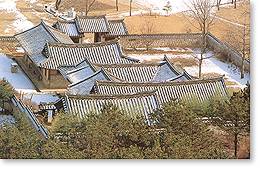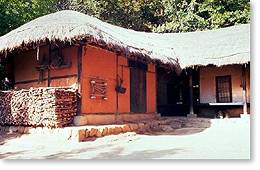

초가집과 기와집, 돌담과 흙담, 아기자기한 산과 시냇물, 마을 어귀의
커다란 정자나무, 서낭당, 사당, 향교 등등. 정적하고 단조한 이 풍경은
전통적인 우리 마을의 정황이다. 자연 경관을 중요시 했던 우리 민족의
주거 형태는 모든 것이 자연적으로 이루어져 이처럼 조화와 균형 속에
배치되었다. 집의 형태는 기후 조건과 자연 환경의 영향을 많이 받는다.

한국의 주거 문화는 선사시대의 움막과 원두막과 같은
생나무 집에서 출발하여 수혈 주거, 귀틀집, 초가, 기와집의
형식을 거쳐 오늘에 이른다.
기원 전 4세기 경 농업 생활의 정착과 함께 우리의 고유한
난방장치인 온돌이 발명되면서 부터 초가집과
기와집이 일반화 되었으며, 기후와 생활 양식에 따라 홑집과
겹집,양통집, 곱은자 집 등의 다양한 형태가 생겨났다. 이처럼 집의 형태나 크기가 달라지면서 주거
생활의 기능도 분화되어 다양하게 확대되기 시작했다. 곡물 저장과 가축사육을 위한 공간이
마련되고, 남녀의 활동 공간을 안채와 바깥채로 구분하였다.
Thatched roof or tile, walls made of dressed stone or mud, small village shrines nestled under old
trees or the elaborate houses of the class, with separate residences for men and women--Korean
architecture and lifestyles vary, but they share a respect for the surrounding natural
environment and an awareness of the community as a whole. Harmony between natural elements and human society is essential.
 In prehistoric times, Koreans lived in pit dwellings, log houses or houses
In prehistoric times, Koreans lived in pit dwellings, log houses or houses
elevated on pilings. There is evidence that the under-floor heating system
used in Korea today was invented around the fourth century B.C.
Thatched and tile roofs also became common around this period. Murals dating to the Koguryo
period (37 B.C.-A.D. 668) depict buildings with substantial columns and with the intricate
bracket structure and colorful decorations found in more recent Korean architecture. Most
likely these were the domiciles of the kingdom's ruling elite. Nevertheless, all housing
became more specialized with the passage of time and the development of the economy; granaries
and barns were added, and with the introduction of Confucianism, separate quarters for menand
women became common. As always, lifestyle reflected the values of Korean society at that time.
<source from http://korea.insights.co.kr>